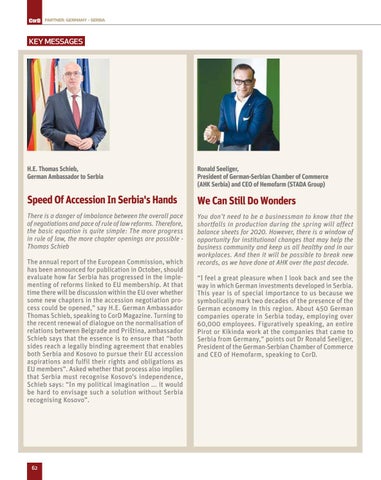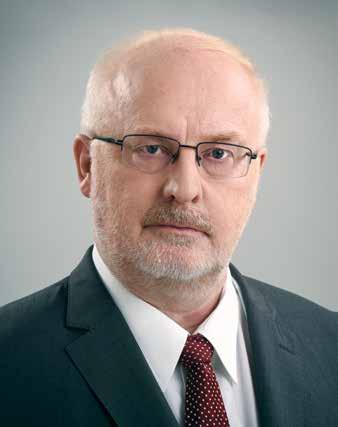PARTNER: GERMANY - SERBIA
KEY MESSAGES
H.E. Thomas Schieb, German Ambassador to Serbia
Ronald Seeliger, President of German-Serbian Chamber of Commerce (AHK Serbia) and CEO of Hemofarm (STADA Group)
Speed Of Accession In Serbia's Hands
We Can Still Do Wonders
There is a danger of imbalance between the overall pace of negotiations and pace of rule of law reforms. Therefore, the basic equation is quite simple: The more progress in rule of law, the more chapter openings are possible Thomas Schieb
You don’t need to be a businessman to know that the shortfalls in production during the spring will affect balance sheets for 2020. However, there is a window of opportunity for institutional changes that may help the business community and keep us all healthy and in our workplaces. And then it will be possible to break new records, as we have done at AHK over the past decade.
The annual report of the European Commission, which has been announced for publication in October, should evaluate how far Serbia has progressed in the implementing of reforms linked to EU membership. At that time there will be discussion within the EU over whether some new chapters in the accession negotiation process could be opened,” say H.E. German Ambassador Thomas Schieb, speaking to CorD Magazine. Turning to the recent renewal of dialogue on the normalisation of relations between Belgrade and Priština, ambassador Schieb says that the essence is to ensure that “both sides reach a legally binding agreement that enables both Serbia and Kosovo to pursue their EU accession aspirations and fulfil their rights and obligations as EU members”. Asked whether that process also implies that Serbia must recognise Kosovo’s independence, Schieb says: “In my political imagination ... it would be hard to envisage such a solution without Serbia recognising Kosovo”.
62
“I feel a great pleasure when I look back and see the way in which German investments developed in Serbia. This year is of special importance to us because we symbolically mark two decades of the presence of the German economy in this region. About 450 German companies operate in Serbia today, employing over 60,000 employees. Figuratively speaking, an entire Pirot or Kikinda work at the companies that came to Serbia from Germany,” points out Dr Ronald Seeliger, President of the German-Serbian Chamber of Commerce and CEO of Hemofarm, speaking to CorD.


























